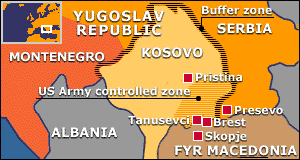 |
 |
 |  |
|
Home |
 |
 |
 |
| 1, March-2001. |
| 2, March-2001. |
| 3, March-2001. |
| 4, March-2001. |
| 5, March-2001. |
| 6, March-2001. |
| 7, March-2001. |
| 8, March-2001. |
| 9, March-2001. |
| 10, March-2001. |
| 11, March-2001. |
| 12, March-2001. |
| 13, March-2001. |
| 14, March-2001. |
| 15, March-2001. |
| 16, March-2001. |
| 17, March-2001. |
| 18, March-2001. |
| 19, March-2001. |
| 20, March-2001. |
| 21, March-2001. |
| 22, March-2001. |
| 23, March-2001. |
| 24, March-2001. |
| 25, March-2001. |
| 26, March-2001. |
| 27, March-2001. |
| 28, March-2001. |
| 29, March-2001. |
| 30, March-2001. |
| 31, March-2001. |
|
|  |
|
 |
Sunday. |
 |
Enter content here The rebels' agenda. BBC The rebels say they do not seek to break up Macedonia. Sunday, 11 March, 2001, 01:34 GMT
By Paul Wood in northern Macedonia
The ethnic Albanian guerrillas known as the National Liberation Army (UCK) have issued a statement setting out their political aims in Macedonia.
The statement calls for a new Macedonian constitution, better rights for Albanians, and international mediation.
Military communique number six sets out in detail the UCK's political aims.
It calls for international mediation of the conflict and a new constitution which would stress that Macedonians and Albanians are equal national groups in the same state.
Most importantly, the UCK stress that they do not want to do anything to damage the integrity of the Macedonian state. This is mainly designed to reassure the international community that the rebels are not trying to achieve Greater Albania, or to partition the country.
Battle for rights
To achieve international support, the rebels are well aware that they must portray their struggle as a battle for human rights, not for territory.
The guerrillas are opposed by the biggest ethnic Albanian political party in Macedonia.
But the reaction to this statement in the Kosovan capital, Pristina, has been interesting.  Previously, the UCK were without any political friends in Pristina, with even former leaders of the Kosovo Liberation Army failing to voice support. This was because of fears that international hostility to a new ethnic Albanian guerrilla group in Macedonia might endanger the project of an independent Kosovo.
But this well-judged statement, deliberately stating moderate political aims, and attempting to reassure the international community, has started to swing opinion around, at least in Pristina.
The crucial unanswered question though, is how much support the UCK have among ordinary ethnic Albanians in Macedonia.
One senior commander told me: "We're organised throughout the country. In seven days, Skopje, Gostivar and Tetevo will all tremble" - a reference to three of the biggest towns in Macedonia.
So far there have been only sporadic clashes, but if these words are true, then Macedonia has never been at greater risk of sliding into civil war. |
|
|
|
|
|



